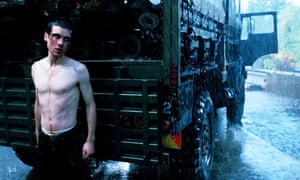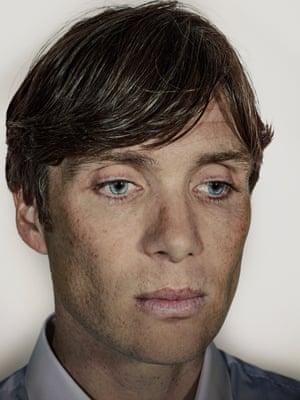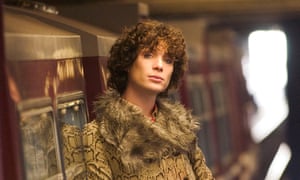Cillian Murphy swaps Peaky Blinders in Birmingham for gun running in Boston in his latest role. Here he talks about moving back to Ireland and being an old-fashioned actor
Will Lawrence
Sunday 12 March 2017
Adirector, I forget who, told me that it takes 30 years to make an actor,” Cillian Murphy says. “And I believe that. You have to learn your craft, learn your trade – and also you have to live a life and experience things. I have been doing this for 20 years now so, hopefully, in another 10 years I will be an actor.”
Though his modesty is sincere, it’s difficult to agree. The Cork-born actor is already loved by millions courtesy of his role as the cold-eyed Brummie gangster Tommy Shelby in BBC2’s Peaky Blinders. He’s proved a huge success on stage and in independent cinema, while also emerging as a bona fide movie star. He’s been acting professionally for half his life. “Honestly,” he adds, “if you stick around long enough, don’t make an idiot of yourself and aspire to make good work, people go: ‘All right. He is here to stay.’”
Murphy is certainly here to stay and has now reached a point, he insists, where he feels comfortable – with the press, industry and, most importantly, himself. “Having just turned 40 I hope I’ve achieved some sort of wisdom or patience,” he says in his soft, evenly paced brogue.
As a younger man he disliked watching himself on screen; he struggled with press duties and avoided TV chat shows until a few years ago. “I was very uncomfortable with this,” he continues with a gesture at my tape recorder and notepad. “The reductive nature nowadays of most journalism is very frustrating.” One newspaper report on the most recent series of Peaky Blinders focused on the baring of his bottom. “It is getting absurd with the dumbing down, the level of questions you get asked.”
We’d better disregard half of my questions, I offer with a smile. Murphy smiles back. “Seriously, though, if someone asks a stupid question, you can only give a stupid answer or appear arrogant. But all of this stuff I tolerate a lot better now. Patience is something that as a young man I didn’t have – when waiting for parts to arrive or waiting for people to behave as I wanted them to.”
Maybe this is because Murphy’s career took off so suddenly. In the summer of 1996 he failed his law exams at University College Cork; his band – the Frank Zappa-influenced the Sons of Mr Green Genes – turned down a deal with Acid Jazz Records; he met his wife, the artist Yvonne McGuinness; and he was cast in the Corcadorca production of the Enda Walsh play Disco Pigs.
The play, originally scheduled for a three-week run in Cork, went on to tour Europe and North America. Murphy left college and quit his band. A film version of the play, in which he also starred, was seen by director Danny Boyle who subsequently cast him in the zombie flick 28 Days Later. It was his breakout movie.
Since then he has excelled in a variety of roles. He chased down director Neil Jordan in the hope he’d get cast as Kitten in Breakfast on Pluto. His performance as a transgender foundling searching for love emerged as one of his standout moments. “I knew Neil was making that film and that I was the right age,” he says. “People respond to direct contact from other artists and other filmmakers. I think people don’t do it enough.” The Palme d’Or-winning The Wind That Shakes the Barley for director Ken Loach followed in 2006.
Perhaps his modesty is the legacy of an upbringing where an artistic career wasn’t seen as a viable option. His parents worked in the Irish education system, his mother as a French teacher, his father a civil servant. They encouraged him to study law. “No one before in my family has ever professionally made a living in the arts [though his father is an accomplished musician], because in the 1980s it was like U2 and Jim Sheridan and Neil Jordan and maybe two others who actually made a living that way.
“I am being facetious,” he adds, “but it wasn’t conceived as a possibility. Gabriel Byrne had to go away. Liam Neeson had to go away. But when I came around, you could make a living as a working actor in theatre. That’s all I ever aspired to.”
And yet, like Byrne and Neeson, Murphy moved away, making his home in London with his wife and children Malachy and Aran, now 11 and nine. After 14 years in the British capital, however, they have just relocated to Dublin. It is, he concedes, a common Irish narrative “to move away in your 20s to England or America to establish yourself and find your calling, and then come home. I always thought that it was retrogressive, but now I realise that it is just natural.” The advancing years are tucking their tendrils into all aspects of his life. “You want to be with your parents as they get older and you want your children to be aware of their culture.”
Did his boys rebel when they were told they’d be leaving their schoolfriends behind? “We promised them a dog so that was just fine.” A black Labrador arrived, though, he says, “I am the only one that walks it, of course.” He has concerns about the Irish education system, which he feels did him few favours, focusing as it does on multiple disciplines. “You get these really bright and creative kids who get eaten up by that system.”
His own children will have to navigate the same system. “If they come out from education with some degree of self-confidence and self-awareness, that’s enough,” says Murphy. “And, hopefully, they will make some good friends. Initially, I was the reluctant one when it came to moving back, but I was quite quickly convinced. Irish people are brilliant and you have to go away and come back to realise it.”
Murphy plays an Irishman in his latest film, Free Fire. As he had done with Jordan all those year ago, he directly petitioned director Ben Wheatley for a role after seeing the writer-director’s award winning film Kill List. Murphy stars with Michael Smiley as Irishmen bidding to conclude an arms deal in a Massachusetts warehouse during the late 1970s. When shots are fired, tension explodes into violence and a feature-length shootout ensues. “The film is unique,” says Murphy. “Ben spoke about it to me at our very first meeting all those years ago and I was very taken with the idea of making a film that is one long gunfight.”
The exchange of fire in Free Fire is something else. The story plays out in real time, in one location, the hail of bullets recalling the work of Sam Peckinpah or Quentin Tarantino.
Murphy and Smiley’s characters, it is implied, are members of the IRA, though this is not mentioned. “Obviously, that was the political backdrop. That was the context – that’s why Irish fellows were out in America buying guns. But it is not a political film in any way.”
Guns also feature in Murphy’s next big-budget outing, the Second World War picture Dunkirk, which sees him reunite with director Christopher Nolan. Nolan had considered Murphy for the lead role in his 2005 Batman reboot. In the end, the job went to Christian Bale, but Nolan selected Murphy as the villainous Scarecrow instead, covering those much-coveted icy blue peepers with a burlap sack. He also cast him in 2010’s Inception.
Though Nolan’s films are usually shrouded in secrecy, as Murphy points out: “Everybody knows what happened at Dunkirk, so it can’t deviate too much from the facts. It is not like Inception or Interstellar, there’s no major reveal.” He describes Nolan as an old-fashioned filmmaker. “And while all of his films have big budgets and involve a lot of set pieces, they always feel like a little independent film for the actor because you only ever have one camera and Chris watches on a tiny little monitor. He is right there beside you.”
His own ambitions as a director, he notes, are a vague itch rather than a burning desire. Thus far he’s only directed music videos, such as Money’sHold Me Forever – though he has found producing on Peaky Blinders, a role he took on for the third season, a rewarding process. “You have to learn to watch yourself and the show very soberly in post-production, with an eye to narrative and storytelling and not to your own particular performance. That is very educational and I enjoy it.”
The show will run for two more seasons. “It is some of the best writing I have come across,” he says, “and I never expected to revisit a character like that over and over. It will be about 30 hours of television when we have finished and to shine a light into all these weird parts of the character’s psyche that you would never ever get in the compressed version of a feature film or even a play, that is an extraordinary gift. I am very lucky that it came along. I have always just been about the work.”
That is irrefutable. “I have not been interested in anything else,” he says. “I know I am old-fashioned, but I don’t want to bring out a fashion line, I don’t want to bring out an album. I just want to do the work as best as I can and if that effects change for somebody, then that is great.” He smiles. “I don’t want to change the world.”THE GUARDIAN







No comments:
Post a Comment